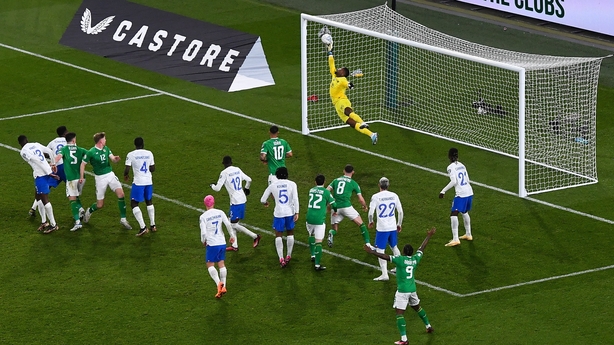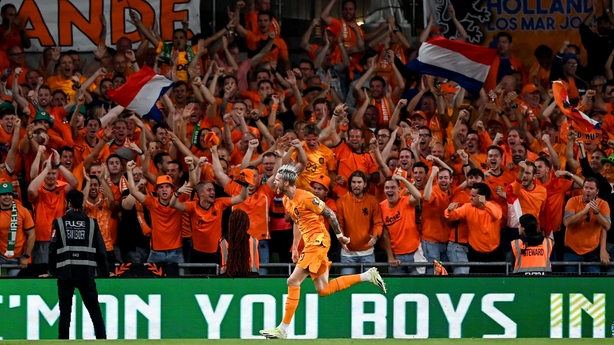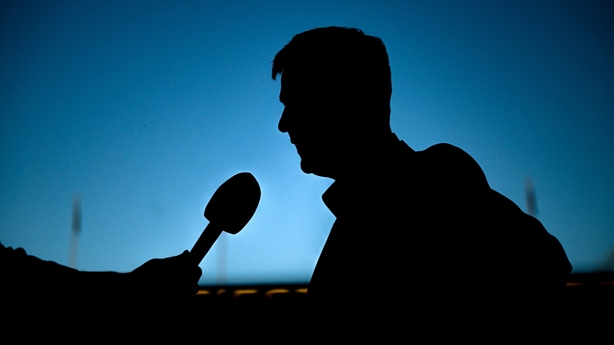2023 will go down as the year when the grand debate over Stephen Kenny gradually quietened to a murmur.
On the surface, the situation has never looked as bleak for the Irish national team, having just completed their most abject qualification attempt since the 1972 European Championships.
Bizarrely still unable to attract a main sponsor, the men's national team are, to borrow a phrase, increasingly looking like the "problem child" of the game here. Corporate Ireland, lining up to throw their underwear at the rugby team, appears to have forgotten that Irish soccer exists.
However, a glance at the squad, and its radically improved age profile, suggests the next six years may not be as depressing as the last.
All told, things did not look promising at the outset of 2023. For the first time in quite a while, the suits in Frankfurt really did us dirty with the draw.
As in Spain '82, Ireland were drawn in a group with France and Netherlands, except this time we'd be without Liam Brady, Frank Stapleton and Mark Lawrenson.
Ireland had finished 2021 having picked up some momentum, rescuing third place in the group with resounding away wins in Azerbaijan and Luxembourg.
Kenny, never slow to trot out a data point which might frame the situation in the best possible light [If he said that "only one defeat in 10 games" stat once, he said it a thousand times], announced that Ireland were now in position to top their 2022 Nations League group.
These hopes were shot after losses in Armenia and at home to Ukraine and the team slumped to a disappointing third which, crucially, narrowed our chances of availing of the Nations League playoff escape route.
Then came the catastrophic group draw. Ireland were the chumps thrown in with the Pot 2 booby prize France, only installed as second seeds as a result of their brazen indifference to the Nations League. Kenny's sympathisers sighed at the gaffer's inexhaustible supply of misfortune; his knockers reckoned he was lucky to still be in the job at all.
It wasn't all gloomy, we hasten to add. On New Year's Eve 2022, Evan Ferguson scored his first Premier League goal for Brighton against then league leaders Arsenal. He'd follow it up with another away to Everton three days later.

We'd fallen prey to over-excitement before - having spent 2019 breathlessly tracking Troy Parrott's scoring exploits with the Spurs under-23s - but the accumulation of evidence suggested Ferguson was indeed a worthy heir to Robbie Keane. Comparisons were drawn with Harry Kane and even - whisper it - Erling Haaland.
Ferguson - who was born 10 days after Brian Kerr's Ireland side drew 0-0 in Paris in 2004 and five days before his father captained Longford Town to a second successive FAI Cup - has 12 Premier League goals to his name at just 19. The mania surrounding the Bettystown striker reached its zenith following his hat-trick against Newcastle in September. And then he promptly got injured, missing that month's international window.
His composure in front of goal was matched by that shown in front of the cameras, as he fended off relentless questioning from Talksport querying why he hadn't declared for England.
Bossman Kenny's first three years in the job were characterised by false dawns which were swiftly followed by sickening doses of reality - the encouraging display against Serbia preceded the Luxembourg disaster, the agonising near miss away to Portugal was followed by a home draw with Azerbaijan. A brief panic would follow the latter as the sceptics inevitably piled on the beleagured gaffer.
While never the slickest media performer, Kenny's sincerity and preacher-like intensity would win around waverers at key moments. At times of acute crisis, the manager would speak from the heart and rally the faithful.
2023 began with another such rousing moral victory, albeit the last one of the Kenny era. Ireland were unlucky not to draw with World Cup finalists France. Nathan Collins' late bullet header produced a stunning save from Mike Maignan, which adorned the front page of every tabloid.
It was Chiedozie Ogbene's finest night in green, the then Rotherham player not only driving up the right wing all evening but combining with Seamus Coleman to render Kylian Mbappe a virtual passenger.
Sceptics argued it was a familiar backs-to-the-wall effort reminiscent of the pre-Kenny era, while the only goal of the game was very much a product of the new approach. Josh Cullen's sideways pass on the edge of his own box would probably have seen him banished indefinitely to international purgatory by Giovanni Trapattoni, where he'd be forced to huddle up beside Andy Reid to keep warm. Benjamin Pavard intercepted and rifled home the winner off the underside of the crossbar.
Still, Irish fans were emboldened after the display, which gave hope that the team could be competitive in a fiendishly difficult group. With the Dutch not exactly pulling up trees, the thoughts of squeezing into second place wasn't considered entirely fanciful.
Then came the fatal blow in June.
All goodwill was shattered irrevocably in Athens, the night when Kenny's backers laid down their arms en masse. One might call it Kenny's Waterloo except that Napoleon's win-loss ratio was just a touch better in the round.
It was the night Ireland's gung-ho optimism, revealed in an attacking gameplan, was exposed as pure delusion. A Greek team who, by all indications, have been stirring up apathy in their homeland, ran riot in the early stages, pinning the visitors back to an incredible extent.
Excuses were thin on the ground after that one. Kenny sought to make an issue of Matt Doherty's late sending off, which was hardly a great miscarriage of justice and beside the point in any case.
Supporters of the regime were thereafter resigned to its failure. This wasn't a Dunphyesque heel turn of old but more a sad recognition of reality.
The match going crowd in Lansdowne had been derided as supportive to the point of cultish but there was a ripple of boos at halftime with the game still scoreless against Gibraltar.
Most gallingly, the lesson many are taking is that Kenny's recent predecessors were in fact right all along.
The autumn programme of games was a grimly inevitable business. A 2-0 loss to France in the Parc des Princes - a long-standing graveyard of Irish sport in more than one code - was to be expected.
Desperately chasing a landmark result that might rescue the campaign, at least in the eyes of posterity, Ireland began with gusto at home to the Dutch. Alan Browne's zealous high pressing startled the visitors, indirectly forcing the early penalty which put Ireland in front.

Ronald Koeman's side had been derided as 'the mediocre generation' at home but they had enough know-how to weather this blitz and were level after 20 minutes. The heavily maligned Wout Weghorst, in 'can-I-play-you-every-week' mood against Ireland, turned home the winner shortly after half-time, yet another goal conceded soon after the restart.
The 2-0 loss at home to Greece was perhaps the worst result of all and confirmed beyond all doubt that Kenny would not see another campaign. Gus Poyet spent the post-match paying tribute to the steadfastness and enthusiasm of the home support, partly to wind up Kenny after the spygate comments and partly as a rebuke to the fickle crowd back home - 'look at how this lot turn out and what little they have to cheer', etc, etc.
Some supporters fell back on the well worn argument that we didn't have the players, having given Martin O'Neill pelters for implying as much five years previously. To Kenny's credit, he never went down this route.
The permutations' eggheads now informed us that our chances of sneaking into the Nations League playoffs were in the margins of 1%, though the public had already checked out in any case.
We hit 1985 on the apathy scale as the campaign wound down. In the mega-pub in which this correspondent watched the Netherlands-Ireland game - which was not on Dublin's southside - only one screen was showing the match in Amsterdam, while the remaining five or six teles broadcast Leinster thumping the Scarlets by 50 points in the RDS. [There was no great clamour to change the viewing arrangement either.]
With the culture war now tilting decisively in their favour, the more vengeful among the anti-Kenny crew broadened the search for scapegoats and rounded on the media for being insufficiently critical. The intellectuals were in the dock.
Judging by assorted Whatsapp and social media correspondence [always a reliable metric of the mood out there] some folk will be satisfied with nothing less than an Oireachtas style public inquiry where several of the big hitters of the Irish football media will be forced to account for their rhetoric since at least 2020.
Following the home defeat to Greece, the Sunday World's Roy Curtis triumphantly laid into what he called "Stephen Kenny's media Praetorian guard - those members of the Fifth Estate, who rather than interrogating the manager's ruinous case file, formed a phalanx of unquestioning bodyguards" and lamented that the sceptics had been abused as "simple-minded old timers" and "flat-earthers".
This blast was presumably reserved for the print media and podcast community, given that no one can claim the TV pundit class were excessively forgiving, either on RTÉ or Virgin Media.
When Kenny's departure was formally announced the day after the New Zealand friendly in November, the post-mortem was entirely muted. In the fashion of Roman Roy, his true believers had pre-grieved.
Most gallingly, the lesson many are taking is that Kenny's recent predecessors were in fact right all along.
Following the chaotic Steve Staunton reign, Irish managers had, one after the other, taken stock of their resources and concluded that the surest way forward was a no-frills gameplan built on stubborn defence and route one attack.
Ireland could try and play a more intricate and adventurous game but they wouldn't have the guile to pull it off - and would only leave themselves more exposed defensively as a consequence of trying.
And anyway, there wasn't the time to attempt anything more lofty in an international window.
The years 2020-23 probably aren't going to convince any of Kenny's predecessors that they got it all wrong.

Over in the Talksport studio, Martin O'Neill is surely relishing his role as Mark Twain's Dad in the latest working out of the old parable.
Some may even have grown nostalgic for the Trap era, when Ireland could go to Armenia and Macedonia, hustle the three points and grumble afterwards about the manner in which it was achieved, as opposed to the latter day approach of losing and seeking solace in the xG.
The true believers in the new way are still resisting any such logic, arguing there is nothing wrong with the basic underlying philosophy, rather it could do with some tactical tweaks here and there.
The year ended on a concerning note for this cohort with Sam Allardyce touting his interest in the job. Big Sam's comments on Second Captains about "brainwashing" and "tippy-tappy football" indicated that word of the recent culture war had indeed reached him. The even more unfashionable Steve Bruce - at least Big Sam's branding is a touch sharper - is also sniffing around, telling a bookie's website he'd fancy a pop.
Info is slow in emerging from the current managerial search, though indicators are that a throwback candidate may not chime with the prevailing mood in Abbotstown. Lee Carsley or Chris Hughton are thought to be among the preferred options.
At the end of all, there are obvious caveats to invoke on Kenny's behalf.
Trapattoni, for instance, had a hardened clique of proven internationals - Keane, Duff, Dunne. In truth, Ireland had already begun to deteriorate from early in 2017, when the oldest squad at Euro 2016 began sucking in air. Few years have been so hopeless and bleakly nondescript as Martin O'Neill's final year in charge in 2018, after Weso and Jon Walters had moved on.
In assessing the Kenny reign, supporters could well argue that Ireland were inevitably bound for a difficult, transitional era regardless of who was in charge and that the regeneration of the squad that began under his watch will bear fruit down the line.
Perhaps the ultimate failure of the Kenny project will focus minds on the deeper problems, notably a grossly underfunded academy structure, which pales in comparison with practically everywhere else in Europe.
Infamously, only two Dubs born between the years 1993 and 1998 have been capped at senior level, both of them peripheral - Jack Byrne and Graham Burke.
This was a quite horrific indictment of the production line in the capital, historically the engine room of the game in Ireland. [The entire Italia 90 squad can be covered under the four Ds - Dublin, Dundalk, Donegal and the diaspora]. The national team have borne the full brunt of these failures since 2017.
The situation on that front looks somewhat healthier as 2023 draws to a close, with Kenny having dished out a whopping 21 debuts. The crop born in the early 2000s at least have a fair whack of caps under their belt already.
Kenny's critics snort that this would have happened regardless of the manager, though would his predecessors have launched Ogbene as early and as often?
It's been a bracing introduction to international football for the incoming generation. Armed with experience, the hope is they will develop into a reliable, top-rank internationals, in which case future observers may take a benign, almost positive, view of the Kenny era.
But with no manager installed and a tumbling world ranking, nothing is guaranteed as we reach the mid-2020s.


